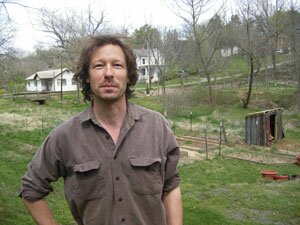Shultz story: Grass is always greener when it's au naturelle

The newest addition in the yard of City Hall-fighting Louis Schultz is a duck house that leads directly into a raised-bed garden.
PHOTO BY LISA PROVENCE
One man who fought City Hall over a green issue seems to have won– or at least found a multi-year truce. Woolen Mills neighborhood resident Louis Schultz says Charlottesville no longer cites him for violating the weed ordinance.
That wasn't the case in 2001. That's when he received a citation for weeds in excess of the City Code-mandated 18 inches on his 1.5-acre historic property at the end of Market Street.
The law was an age-old attempt to prevent blight. But what the City considered weeds, Schultz defended as a natural way to control erosion around the creek that flows through his land– as well as a way to encourage native flora and fauna and preserve the landscape's rural character.
"I just like the way it looks," adds Schultz.
Ultimately, Schultz's refusal to comply with City officials led to a new procedure for so-called natural landscaping within the City Code.
"We worked with him, and we formalized it so we don't get in a situation where we don't have a process on file," says Angela Tucker, the city planning manager in charge of code enforcement. She points to the vegetation management operating procedure on the city's website.
Tucker suggests that one man's natural landscaping is another's poison ivy, and if that poison ivy has grown up a shared fence, then it becomes a health and safety issue.
Under the new rules, even after a resident's landscaping plan is on file with the city, only 25 percent of a yard may be dedicated to natural landscaping. But Tucker acknowledges the environmental benefit of less mowing.
"The City is reaching a good balance between the built environment and green space," she says.
Eight years later, Schultz's landscape has matured, with fewer invasives and more native vegetation, and he says that's what he intended all along.
"The idea was not to leave it completely alone," he says. "It's not like I don't mow."
Using plantings to control erosion on his flood-prone creek just makes more sense environmentally to Schulz. "I think it's kind of stupid to burn gas and mow everything," he declares.
His grass control ideal? "I'd stick a goat out there in a minute if that were legal in the City."
#